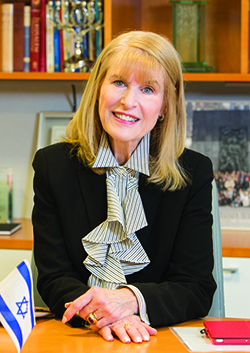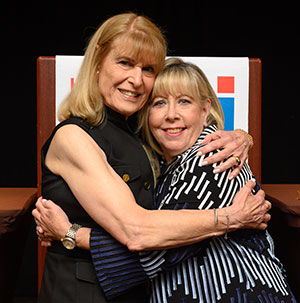Hadassah
President's Column
Tisha B’Av as a Lesson in Memory, Progress and Service

This is the season when our thoughts typically turn to vacation, family and how much happiness we can pursue before the routines of work and school set in. But in the middle of the calendar, the saddest of days stares at us: Tisha B’Av—the Ninth of Av—which this year falls on August 11.
Every nation and culture observes solemn days, but it’s hard to think of an example as heavy as Tisha B’Av. Even those who don’t observe the fast know the significance: Commemorating the destruction of the First and Second Temples in Jerusalem as well as a host of other catastrophes, including the 1492 expulsion order of the Jews from Spain and the day in 1941 when the Nazi regime in Germany formally approved the Final Solution.
Memory is at the heart of survival and progress. This is true for humanity as a whole: The first cure of any disease is typically based on records and study of previous treatment and research. The same is true for knowing how to react in a given situation—from a parent responding to a child’s question to a nation defending itself against attack—based on memory of previous challenges.
And perhaps because we are obliged to remember the lowest points of Jewish experience, our tradition likewise exalts happiness. Deuteronomy teaches that we are not only required to serve God, but to do so with gladness of heart. Proverbs equates finding the right answer to any question with joy.
All the blessings we live today—crowded into our lives that also include challenges and sorrows—flow from our memory.
So even as we make our annual passage through the gravity of Tisha B’Av, consider the blessings we enjoy. Despite the constant debate about health care, we live longer, healthier lives than any previous generation. Despite continued anti-Semitism, the vast majority of Jews today live in free societies. Despite the challenges of every nation and those unique to the Jewish nation, Israel is strong and able to defend itself.
The most revolutionary ideas are almost never entirely new but based on careful study of the past. Neither Hadassah nor Israel—not to mention the Jewish people—would exist today if it weren’t for diligent learning of our history. The basis of Henrietta Szold’s plan for Hadassah to empower women and be part of building the Zionist enterprise was study, primarily of Jewish texts. She recognized that without knowing who we were, we could never become who we wanted to be.
The quest to educate and empower ourselves has enabled Hadassah to flourish and to play a pivotal role in Jewish life and the development of Israel—pre-state and post-independence—for 107 years, producing new generations of leaders to confront the challenges sure to come. My four-year presidential term will soon be ending, and at last month’s Hadassah National Convention in New York we chose the women who will lead us into the future. (For full coverage of the convention, see the September/October print edition of Hadassah Magazine.)

It is my great pleasure to congratulate Rhoda Smolow—who will succeed me on January 1, 2020—on her election as Hadassah’s 27th national president. Rhoda has brought great energy, imagination and dedication to her years of Hadassah service. And given the pivotal role of education in meeting the challenges of our time, it is fitting that she is a teacher by profession.
My congratulations as well to the three new national vice presidents—Rachel Schonberger, Marcia Gabriolove Laden and Janet Deixler—as well as to new members of the national board. My wish for them all is to serve in wisdom and joy, and to experience only the sadness that comes from commemorating our past.
In our vast and complicated universe, an education that includes studying the worst that can and has happened is the best way to ensure that we will not only survive and flourish, but continue to know joy.










 Facebook
Facebook Instagram
Instagram Twitter
Twitter
Leave a Reply